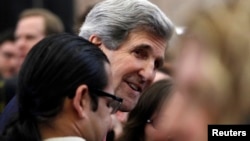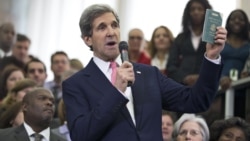The foundation of American foreign policy is “firmly rooted in righteousness and justice.” Newly sworn-in U.S. Secretary of State John Kerry recalled these words of former U.S. President Harry Truman as Mr. Kerry spoke to State Department employees about their work and his, his first day on the job:
“We get to try to make peace in the world, a world where there is far too much conflict and far too much killing. There are alternatives. We get to lift people out of poverty. We get to try to cure disease. We get to try to empower people with human rights. We get to speak to those who have no voice. We get to talk about empowering people through our ideals, and through those ideals hopefully they can change their lives.”
During his confirmation hearings, Secretary-elect Kerry outlined how such ideals influence U.S. foreign policy. He told the U.S. Senate that the work of the nation abroad should not be eclipsed by the counter-terrorism role the U.S. has been forced into since the terrorist attacks of September 11, 2001:
“American foreign policy is also defined by food security and energy security, humanitarian assistance, the fight against disease and the push for development, as much as it is by any single counter terrorism initiative – and it must be.”
Mr. Kerry said that “today’s world is more complicated than anything we have experienced”:
“From the emergence of China, to the Arab Awakening; inextricably linked economic, health, environmental and demographic issues, proliferation, poverty, pandemic disease, refugees, conflict ongoing in Afghanistan, entire populations and faiths struggling with the demands of modernity, and the accelerating pace of technological innovation invading all of that, shifting power from nation-states to individuals.”
This environment makes the multi-faceted work of diplomacy increasingly important. “This really is a time for American leadership,” he told the U.S. Senate. And the work of such leadership falls in a large part to the men and women of the U.S. Department of State: “We get to live the ideals of our nation,” he said. “And in doing so I think we can make our country stronger and we can actually make the world more peaceful.”
“We get to try to make peace in the world, a world where there is far too much conflict and far too much killing. There are alternatives. We get to lift people out of poverty. We get to try to cure disease. We get to try to empower people with human rights. We get to speak to those who have no voice. We get to talk about empowering people through our ideals, and through those ideals hopefully they can change their lives.”
During his confirmation hearings, Secretary-elect Kerry outlined how such ideals influence U.S. foreign policy. He told the U.S. Senate that the work of the nation abroad should not be eclipsed by the counter-terrorism role the U.S. has been forced into since the terrorist attacks of September 11, 2001:
“American foreign policy is also defined by food security and energy security, humanitarian assistance, the fight against disease and the push for development, as much as it is by any single counter terrorism initiative – and it must be.”
Mr. Kerry said that “today’s world is more complicated than anything we have experienced”:
“From the emergence of China, to the Arab Awakening; inextricably linked economic, health, environmental and demographic issues, proliferation, poverty, pandemic disease, refugees, conflict ongoing in Afghanistan, entire populations and faiths struggling with the demands of modernity, and the accelerating pace of technological innovation invading all of that, shifting power from nation-states to individuals.”
This environment makes the multi-faceted work of diplomacy increasingly important. “This really is a time for American leadership,” he told the U.S. Senate. And the work of such leadership falls in a large part to the men and women of the U.S. Department of State: “We get to live the ideals of our nation,” he said. “And in doing so I think we can make our country stronger and we can actually make the world more peaceful.”






